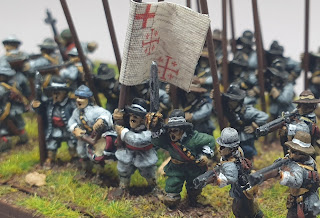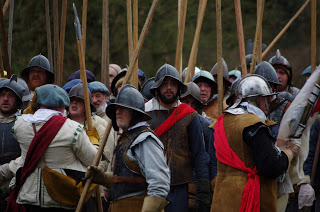Sir Henry Bard’s Regiment of Foot
Sir Henry Bard inherited the Regiment from Colonel Thomas Pinchbeck, who had managed to get himself killed at First Newbury.
Originally raised in Northumberland, they were sent to Oxford not long after formation, to reinforce the King's Oxford Army. Not long after arriving in Oxford the Regiment was split and Lord Percy's Regiment was formed from part of the Regiment.
As Pinchbeck's they garrisoned Oxford before venturing to Newbury where Pinchbeck fell. Early in 1644 Sir Henry was commissioned as Colonel of the Regiment. Noted as wearing grey coats at the February 1644 Oxford muster by Symonds in his diary. They carried white flags with unorthodox heraldic devices - a large cross, with a smaller cross in each quarter. Peachey and Prince tantalisingly state that they would discuss these devices in their second volume of ECW Flags..., but unfortunately they never got around to writing it.
Bard's (finally I hear both my regular readers shout) first outing as Colonel was almost as devastating as Pinchbeck's outing to Newbury: Sir Henry lost an arm at Cheriton, and was captured. Not a very lucky position to hold, Colonel of this Regiment.
They went on to fight at Cropredy Bridge, Lostwithiel, Second Newbury, before garrisoning Campden House, where they pretty much stayed until they had a part in storming Leicester and the battle of Naseby.
After Naseby, Bard was appointed governor of Worcester, and made an Irish peer as Viscount Bellomont. On a journey to Ireland in December 1646, his vessel was captured by a Parliamentarian warship and Bard was brought back a prisoner to England. He was released in 1647 on condition that he left England, he made his way to Bruges to join the Royal Court in exile.
In 1653 Charles II sent Bard to the Shah of Persia, to obtain financial help to recover the throne of England. Bard travelled in disguise through Turkey and Armenia to arrive in Persia in September 1654. Although he was well-received by Shah Abbas II, Bard's negotiations were unsuccessful. On his own initiative, he travelled to India to seek aid from the Mughal Emperor Shah Jahan. He arrived at Surat in January 1656 but died the following June at Hodal, apparently of heat exhaustion.
Originally raised in Northumberland, they were sent to Oxford not long after formation, to reinforce the King's Oxford Army. Not long after arriving in Oxford the Regiment was split and Lord Percy's Regiment was formed from part of the Regiment.
As Pinchbeck's they garrisoned Oxford before venturing to Newbury where Pinchbeck fell. Early in 1644 Sir Henry was commissioned as Colonel of the Regiment. Noted as wearing grey coats at the February 1644 Oxford muster by Symonds in his diary. They carried white flags with unorthodox heraldic devices - a large cross, with a smaller cross in each quarter. Peachey and Prince tantalisingly state that they would discuss these devices in their second volume of ECW Flags..., but unfortunately they never got around to writing it.
Bard's (finally I hear both my regular readers shout) first outing as Colonel was almost as devastating as Pinchbeck's outing to Newbury: Sir Henry lost an arm at Cheriton, and was captured. Not a very lucky position to hold, Colonel of this Regiment.
They went on to fight at Cropredy Bridge, Lostwithiel, Second Newbury, before garrisoning Campden House, where they pretty much stayed until they had a part in storming Leicester and the battle of Naseby.
After Naseby, Bard was appointed governor of Worcester, and made an Irish peer as Viscount Bellomont. On a journey to Ireland in December 1646, his vessel was captured by a Parliamentarian warship and Bard was brought back a prisoner to England. He was released in 1647 on condition that he left England, he made his way to Bruges to join the Royal Court in exile.
 |
| Painted by Alan Tuckey, basing by myself |
In 1653 Charles II sent Bard to the Shah of Persia, to obtain financial help to recover the throne of England. Bard travelled in disguise through Turkey and Armenia to arrive in Persia in September 1654. Although he was well-received by Shah Abbas II, Bard's negotiations were unsuccessful. On his own initiative, he travelled to India to seek aid from the Mughal Emperor Shah Jahan. He arrived at Surat in January 1656 but died the following June at Hodal, apparently of heat exhaustion.
If you enjoyed reading this, or any of the other posts, please consider supporting the blog.
Thanks.













Fascinating history of Bard, and I love that flag...
ReplyDeleteMight have been better if Bard had sat the war out.
DeleteFor some reason I selected 'with effect' when I ordered the flag, don't normally. But in this case it works really well. Might revisit all my other white flags...
What an unusual last few years of his life; and, really, an English King looking to borrow money from Asian kings in the 17th century is something I would never have considered likely.
ReplyDeleteIt is a fascinating story. Agreed, don't really think of England looking to Asia, yet western cultures had been travelling that far east since Roman times
DeleteBard was subsequently disinterred on orders of Shah Jihan (who had the Taj Mahal built) and reburied in the Catholic (Christian) cemetery at Agra. This still exists, though not widely known about. It has lots of varied burial monuments of settlers, at least one headstone was restored recently. It would be a fitting end to Bard's life story if his burial plot was known. For a period Bard's daughter was Prince Rupert's mistress.
DeleteThanks for that information. Much appreciated
Delete